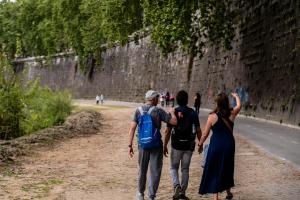The plan is based on environmental efforts of the ECO-CRUISING FU_TOUR Project.
MADRID, SPAIN, October 16, 2024 /EINPresswire.com/ — The risk of a massive influx of tourists is the main challenge for the cruise industry in the Mediterranean region, according to the Environmental Impact Analysis (EIA) launched by the Cyprus Marine and Maritime Institute (CMMI), one of the partners of the ECO-CRUISING FU_TOUR -the EU co-funded project aiming at exploiting the green and blue potential of the West Mediterranean tourism SMEs-. This report highlights that the Mediterranean is one of the Top 10 global cruise destinations, attracting around 5,5 million passengers per year, and alerts that this number is expected to rise between 7 and 8 million by 2028. Such a surge in tourist numbers, especially when multiple cruise ships dock simultaneously, can overwhelm small or medium-sized urban areas. The consequences include environmental degradation, strain on infrastructure, and damage to cultural sites, as well as adverse effects on local communities.
The CMMI has drawn a roadmap with specific measures to mitigate the negative impact of this tourist influx, focusing on the ECO-CRUISING FU_TOUR Project’s commitment to advancing towards more sustainable cruise tourism practices in the Mediterranean. To the CMMI representatives, “there are some mitigation measures that can significantly alleviate these impacts, such as improving the infrastructure, promoting sustainable tourism practices, or regulating tourist numbers, but they may not entirely solve the problem”. For this reason, the roadmap drawn by the CMMI stresses on the following three effective measures to tackle the environmental challenges posed by tourism in the Mediterranean:
• A great commitment from local authorities: They are responsible for creating policies, allocating resources and coordinating stakeholders. However, their commitment can vary due to political changes, priorities, and public pressure. Sustainable tourism requires authorities to prioritize long-term environmental health over short-term economic gains.
• More cooperation of the tourism industry: This industry plays a vital role in influencing tourist behavior. Industry cooperation is essential for promoting sustainable practices and adhering to regulations. However, business often prioritize profitability, which can lead to resistance against measures that limit tourist numbers or increase costs. Effective cooperation requires a collaborative approach and the industry’s willingness to innovate and adapt to sustainable practices, which may require significant changes to business models and investment in new technologies.
• Changing tourism behavior: Tourists come from diverse backgrounds, and not all may be aware of or willing to adopt sustainable practices. Providing incentives for sustainable behavior, such as discounts for eco-friendly transportation or penalties for littering can help modify behavior. These incentives need to be carefully designed and enforced to be effective.
Círculo de Comunicación
email us here
Círculo de Comunicación
Legal Disclaimer:
EIN Presswire provides this news content “as is” without warranty of any kind. We do not accept any responsibility or liability
for the accuracy, content, images, videos, licenses, completeness, legality, or reliability of the information contained in this
article. If you have any complaints or copyright issues related to this article, kindly contact the author above.
![]()






